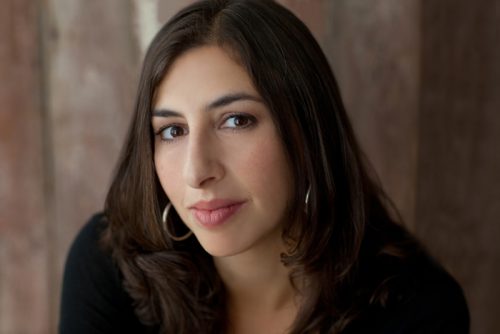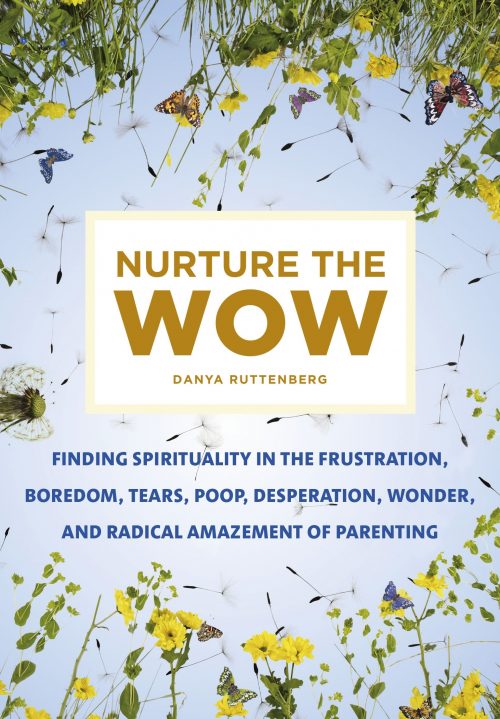It’s a sensation that new parents know well: When you’re tired, cranky and it’s been a week since you’ve showered, it’s tempting to wonder whether God even exists. (And if so, why did he or she invent “SpongeBob SquarePants”?) Rabbi Danya Ruttenberg, who lived in Brookline for several years, wrote “Nurture the Wow: Finding Spirituality in the Frustration, Boredom, Tears, Poop, Desperation, Wonder, and Radical Amazement of Parenting” to give us renewed perspective.
As Ruttenberg recently noted in The Atlantic, parenthood isn’t typically examined from a religious lens. In the book, she looks at the challenges of parenting young children and suggests a transformative idea: Maybe—like going to synagogue, hiking or running, meditating or gardening—the work of parenting can be a spiritual path in its own right, regardless of religion. She sat down with JewishBoston to discuss the book and how to find the divine, even among the mundane.

Rabbi Danya Ruttenberg
There’s a glut of parenting writing out there. What niche do you want this book to fill?
A lot of books talk about how to relate to your children, whether it’s discipline, bedtime or educational stuff, or how to raise mindful children who are Jewishly engaged. But there’s very little out there about parents‘ experiences in parenting. It’s a unique stage of life and a type of work. It changes you in really unique ways. The kid who wakes up is not the one you put down to bed last night. You need to develop new tricks, and there’s a cognitive flexibility that comes with that. While it’s hard and powerful and crazy-making, a lot of it is really unique. We have mommy blogs that talk about, “Oh yeah, I drink.” There’s nothing addressing in a deep, existential way how to engage with the child in front of you.
A lot of books talk about how to relate to your children, whether it’s discipline, bedtime or educational stuff, or how to raise mindful children who are Jewishly engaged. But there’s very little out there about parents‘ experiences in parenting. It’s a unique stage of life and a type of work. It changes you in really unique ways. The kid who wakes up is not the one you put down to bed last night. You need to develop new tricks, and there’s a cognitive flexibility that comes with that. While it’s hard and powerful and crazy-making, a lot of it is really unique. We have mommy blogs that talk about, “Oh yeah, I drink.” There’s nothing addressing in a deep, existential way how to engage with the child in front of you.
What knowledge do you hope to impart to parents?
I hope it makes parents feel valued and validated in the work they’re doing. I hope it gives them some new tools and new lenses for when you’re deep down in it and things feel really hard. I hope it gives people new ways of experiencing awe and wonder and radical amazement and feeling hard feelings, and not pushing them away. I want parents to face up to feelings of power and powerlessness. And I hope it gives them a sense of what spirituality and spiritual practice can be. I hope they experience their own parenting as a legitimate form of spiritual practice.
I hope it makes parents feel valued and validated in the work they’re doing. I hope it gives them some new tools and new lenses for when you’re deep down in it and things feel really hard. I hope it gives people new ways of experiencing awe and wonder and radical amazement and feeling hard feelings, and not pushing them away. I want parents to face up to feelings of power and powerlessness. And I hope it gives them a sense of what spirituality and spiritual practice can be. I hope they experience their own parenting as a legitimate form of spiritual practice.
What is spirituality?
 Spirituality is something you do over and over again, and with a certain intention. It transforms how you experience yourself, your sense of place in the world, your relationships with other people and your relationship with holiness, or with God. We talk about activities like painting, running, prayer, meditation, yoga and all of these things as a form of spirituality, but parenting is an activity that we do repeatedly too. If we do it with the right intention, it can transform how we experience our own lives.
Spirituality is something you do over and over again, and with a certain intention. It transforms how you experience yourself, your sense of place in the world, your relationships with other people and your relationship with holiness, or with God. We talk about activities like painting, running, prayer, meditation, yoga and all of these things as a form of spirituality, but parenting is an activity that we do repeatedly too. If we do it with the right intention, it can transform how we experience our own lives.
 Spirituality is something you do over and over again, and with a certain intention. It transforms how you experience yourself, your sense of place in the world, your relationships with other people and your relationship with holiness, or with God. We talk about activities like painting, running, prayer, meditation, yoga and all of these things as a form of spirituality, but parenting is an activity that we do repeatedly too. If we do it with the right intention, it can transform how we experience our own lives.
Spirituality is something you do over and over again, and with a certain intention. It transforms how you experience yourself, your sense of place in the world, your relationships with other people and your relationship with holiness, or with God. We talk about activities like painting, running, prayer, meditation, yoga and all of these things as a form of spirituality, but parenting is an activity that we do repeatedly too. If we do it with the right intention, it can transform how we experience our own lives.What challenges do modern-day parents have when it comes to finding spirituality?
We are sold a bill of goods. If your kids’ lunches don’t look perfect with a sandwich in the shape of a panda, you’ve failed! This has been told to parents for a long time, and now it’s just changed forms. Now we’re in a Facebook culture where everyone is showing their smiling children in a perfect, organic moment. You don’t see one kid hitting the other kid. The work-family thing is impossible to do perfectly. A lot of what my book tries to do is give people tools to engage with the heart and the crazy-making and the despair and the “good enough” and find the sparks of light. Find the sparks of light in the peas on the floor or in the next load of laundry. Find that moment of expansiveness and compassion and connection when it’s 2 a.m. If you find it for a minute today and you find it for a minute-and-a-half tomorrow, you’re working this muscle of compassion and connection and awe. It becomes easier to find it, once you start.
We are sold a bill of goods. If your kids’ lunches don’t look perfect with a sandwich in the shape of a panda, you’ve failed! This has been told to parents for a long time, and now it’s just changed forms. Now we’re in a Facebook culture where everyone is showing their smiling children in a perfect, organic moment. You don’t see one kid hitting the other kid. The work-family thing is impossible to do perfectly. A lot of what my book tries to do is give people tools to engage with the heart and the crazy-making and the despair and the “good enough” and find the sparks of light. Find the sparks of light in the peas on the floor or in the next load of laundry. Find that moment of expansiveness and compassion and connection when it’s 2 a.m. If you find it for a minute today and you find it for a minute-and-a-half tomorrow, you’re working this muscle of compassion and connection and awe. It becomes easier to find it, once you start.
How can a parent experience spirituality when bleary-eyed and encrusted with spit-up?
We have a tendency sometimes to look at our kids as objects that are keeping us from where we need to go. I had a thing a couple of weeks ago with my middle child, who was hungry. I gave him a cookie, not an everyday thing in our house. We were walking down the street, and half the cookie fell on the sidewalk. He was hysterical. He wouldn’t move. At first I looked at him as this object getting in the way of me getting home. Then I remembered my own advice, which I give to everybody else. I looked at him and asked, “What do you need? What are you going through?” When I stopped looking at him as an obstacle and was able to see him in his wholeness, and how powerless he was, I was able to come up with the right words that he needed to hear. So maybe your intention with spilled peas is to find the holiness just in that moment, to try to be 100 percent there.
We have a tendency sometimes to look at our kids as objects that are keeping us from where we need to go. I had a thing a couple of weeks ago with my middle child, who was hungry. I gave him a cookie, not an everyday thing in our house. We were walking down the street, and half the cookie fell on the sidewalk. He was hysterical. He wouldn’t move. At first I looked at him as this object getting in the way of me getting home. Then I remembered my own advice, which I give to everybody else. I looked at him and asked, “What do you need? What are you going through?” When I stopped looking at him as an obstacle and was able to see him in his wholeness, and how powerless he was, I was able to come up with the right words that he needed to hear. So maybe your intention with spilled peas is to find the holiness just in that moment, to try to be 100 percent there.
How do Judaic principles relate to parenting?
Pluralism is my way of being a rabbi. I don’t presume anyone believes in anything in particular or has the same practice I do. I very intentionally wrote this for Jews of all backgrounds, and non-Jews can also find power and wisdom in it. Rabbi Abraham Joshua Heschel talks about “radical amazement,” or finding that awe and wonder in the everyday. That is the root of spirituality, which I observe. The people who are best in the world at radical amazement are kids. We need to get out of our heads a little bit and actually be present, like when kids looks at a pile of ants: “Wow, this is so cool!” I really believe that love is the doorway to the holy. I’m not the only one. It’s a rich teaching from our tradition. If we take love for our children seriously, it can take us everywhere.
Pluralism is my way of being a rabbi. I don’t presume anyone believes in anything in particular or has the same practice I do. I very intentionally wrote this for Jews of all backgrounds, and non-Jews can also find power and wisdom in it. Rabbi Abraham Joshua Heschel talks about “radical amazement,” or finding that awe and wonder in the everyday. That is the root of spirituality, which I observe. The people who are best in the world at radical amazement are kids. We need to get out of our heads a little bit and actually be present, like when kids looks at a pile of ants: “Wow, this is so cool!” I really believe that love is the doorway to the holy. I’m not the only one. It’s a rich teaching from our tradition. If we take love for our children seriously, it can take us everywhere.
This post has been contributed by a third party. The opinions, facts and any media content are presented solely by the author, and JewishBoston assumes no responsibility for them. Want to add your voice to the conversation? Publish your own post here. MORE



